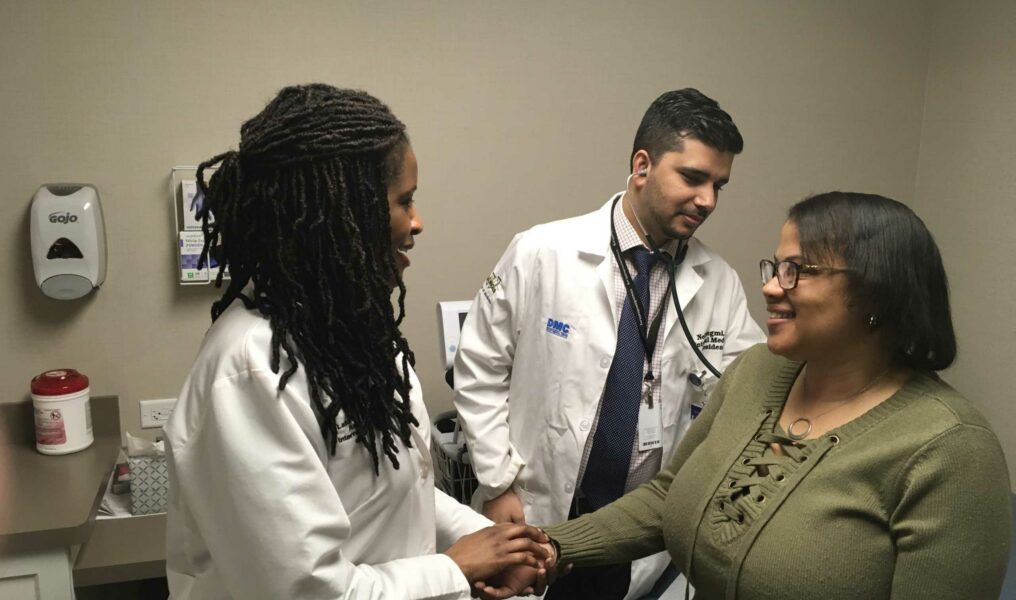By Patrick Yankee
DETROIT – March 23 through 29 is LGBT Health Awareness Week, the perfect time to bring attention to the cycle of discrimination and health disparities that affect LGBTQ people in Michigan and beyond, and to discuss how to improve LGBTQ health care. Just as our LGBTQ population often encounters discrimination in housing, employment and other aspects of their daily lives, the same applies to health care. Corktown Health Center is the state's only nonprofit medical center focused on improving the health of Michigan's LGBTQ community.
"The need for a clinic like ours stems from hearing horror stories from the LGBT community of their experiences with doctors who were insensitive and ignorant to their needs," said Anthony Williams, CEO of Corktown Health Center. "We provide a space that is welcoming to everyone, regardless of how they identify."
With so many in the community having past negative experiences due to doctors lacking the training to properly care for LGBTQ patients, it's no surprise that so many LGBTQ individuals will skip primary care and put themselves at risk for diseases that could have been prevented or caught in a more timely fashion.
There are other factors affecting LGBTQ health, too. A report released last year by the Williams Institute of the UCLA School of Law, The Impact of Stigma and Discrimination Against LGBT People in Michigan, noted that stigma and discrimination contribute to adverse health outcomes for LGBTQ people – such as major depressive disorder, binge drinking and substance use.
To determine the needs of our patients, Corktown Health Center recently conducted a Community Health Needs Assessment called Shaping the Future of LGBTQ Health Care in Southeast Michigan.
Among the highlights:
• Approximately 4/5 of participants reported having a primary care provider
• 70 percent reported that the provider knew their sexual orientation
• 86 percent reported their provider knew their gender identification.
Harsh Realities
• At least half of individuals reported that their sexual orientation, gender identity, and socioeconomic status concerned them when seeking health care.
• Concern about care due to race was highest among African Americans.
• Transgender participants reported high concern about discrimination due to gender identity, with 2/3 of transgender men reporting discrimination by a provider.
Alarming LGBTQ Health Facts
• LGBTQ populations have higher rates of tobacco, alcohol and other drug use.
• Transgender individuals have a higher prevalence of victimization, mental health issues, suicide, HIV and other sexually transmitted infections, and they are less likely to have health insurance.
• LGBTQ youths are 2-3 times more likely to attempt suicide.
• LGBTQ adults have double the risk of suicide attempts; and there is a 40 percent chance that transgender adults will attempt suicide in their lifetime.
• Lesbian and bisexual women are less likely to receive screening for breast and cervical cancer.
Training the doctors
Corktown Health Center's team believes that for the gap in health care for the LGBTQ population to close, it will require working with medical schools and professionals to help them understand and be responsive to the needs of the LGBTQ population. There are also issues in the legal landscape in Michigan – such as the exclusion of LGBTQ citizens from protection under the Elliott-Larsen Civil Rights Act – that continue to exacerbate the disparity issues discussed here. In the end, it's about ensuring access to comprehensive health care for LGBTQ patients, and both patients and doctors being comfortable discussing all health matters.
"While these topics have traditionally been ignored by medical schools, it's helpful that schools like Wayne State University are starting to train their medical students about specific needs relating to LGBT patients, which can only help communication and make a visit to the doctor less daunting for an LGBT patient," said Dr. LaTonya Riddle-Jones, medical director at Corktown Health Center and an assistant professor of Internal Medicine and Pediatrics at Wayne State University School of Medicine. "But there's still lots of work to be done."
Patrick Yankee is the Chief Development Office at Corktown Health Center, a new medical home focused on serving the LGBTQ community in Southeastern Michigan. For more information go to corktownhealth.org or call 313-832-3300.










